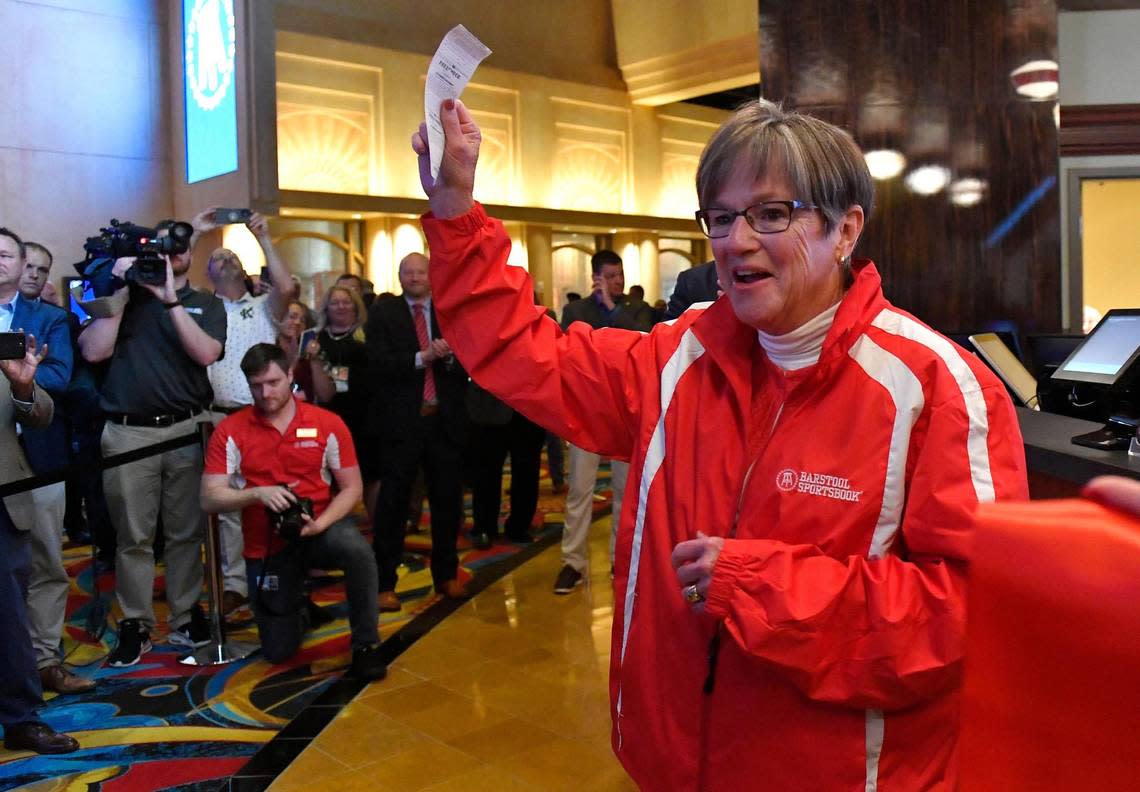Kansas plan to draw Chiefs, Royals is now law after Gov. Kelly signs STAR bonds bill

- Oops!Something went wrong.Please try again later.
Kansas Gov. Laura Kelly on Friday signed into law an expansive plan to draw the Kansas City Chiefs and Royals into the state by issuing billions in bonds to finance new stadiums for the teams.
The Democratic governor also signed a tax cuts package she negotiated with top Republican lawmakers. The Legislature passed both the stadiums plan and the tax cuts in a one-day special session on Tuesday.
The plan for winning over the Chiefs and Royals relies on billions in Sales Tax and Revenue, or STAR bonds. Under the new law, the bonds would be paid back by tax revenues from within any new stadiums and surrounding retail development, as well as future sports betting and Kansas Lottery revenues.
Kansas lawmakers plunged ahead with the plan, now signed by Kelly, despite extensive research that stadium projects almost never earn back the amount of public aid that goes into them. Decades of research shows stadiums aren’t major drivers of economic growth.
Supporters of the new law have said Kansas has a generational opportunity to land a major professional sports team. Jackson County voters in April rejected a sales tax that would have guaranteed the teams remained in Kansas City, opening the door to Kansas.
Kelly issued only a muted comment about the legislation on Friday. She has previously told reporters that she wasn’t going to invest much energy into the effort.
“We know that modernizing our economic development tools provides the opportunity to increase private investment into the state,” Kelly said. “By modifying the STAR Bonds program, one of our strongest economic development mechanisms, lawmakers crafted a viable option for attracting professional sports teams to Kansas.”
The law authorizes Kansas to potentially issue STAR bonds to pay for up to 70% of the cost of stadiums for one or both teams – up from the 50% in current law. A Chiefs stadium alone could cost at least $2 billion. A Royals stadium could be another $1.5 billion, if not more.
The debt would be repaid over 30 years by a combination of tax revenue from the stadiums and surrounding development, sports gambling revenue and Lottery revenue. As part of the bill, annual Lottery revenues above $71.5 million each year will now be redirected into a fund to help pay off the bonds, a change likely worth about $10 million a year.
Cities and the counties would have the option to pledge local tax revenue from inside the STAR bond district toward repaying bonds, but wouldn’t have to. But any local government that decides against pledging revenue would likely lose leverage during negotiations over the terms of a STAR bond agreement with one or both teams.
“Kansas’ unique STAR Bond tool now provides an additional option for the Kansas City Chiefs and Royals to remain in the Kansas City region without raising taxes to fund new, state-of-the-art stadium complexes for both teams,” Senate President Ty Masterson, an Andover Republican, and House Speaker Dan Hawkins, a Wichita Republican, said in a joint statement.
“This exciting, once-in-a-lifetime opportunity holds unlimited potential for both our state and for Chiefs and Royals fans everywhere.”
The law authorizes the Kansas secretary of commerce, currently Lt. Gov. David Toland, to negotiate a STAR bond agreement. Any deal would have to be approved by the Legislative Coordinating Council, which includes top House and Senate leaders from both parties. Republicans hold a 6-2 majority on the council.
While the LCC’s vote on an agreement would be public, it could deliberate privately. The proposal keeps revenue reports filed on a STAR bond district confidential.
Tax Cuts
Kelly also signed into a tax cuts package passed with bipartisan support.
The package consolidates the state’s three income tax brackets into two, while cutting rates, providing all taxpayers a reduction. It also includes tax cuts for retired residents and a larger property tax exemption for homes.
The package is expected to cost about $380 million a year. While all sides want tax cuts, Kelly had said their annual cost shouldn’t exceed roughly $425 million. Because of previously passed tax reductions, lawmakers believed they needed to limit a package to about $375 million to satisfy the governor.
The law sets income tax rates at 5.2% and 5.58% with the dividing line between the brackets at $23,000 annual income. Under current Kansas law, the brackets are set at 3.1%, 5.25% and 5.7%, with individuals making over $30,000 a year in taxable income taxed at the top rate.
The law, called Senate Bill 1, also eliminates taxes on Social Security income and ends an often-underfunded property tax reduction program for local governments.
“I am proud to be delivering on my commitment to responsible, meaningful tax relief for all Kansans,” Kelly said. “I appreciate the Legislature’s quick work to pass this tax relief package. Senate Bill 1 provides significant tax relief while preserving our ability to continue fully funding our public schools, roads and bridges, and State Water Plan.”
Masterson and Hawkins said more tax cuts could have been included in the bill, but nevertheless called the measure “an important first step” and promised a focus on property tax relief when the Legislature returns in January.
“Broad property and income tax relief is now officially on its way to every Kansan,” Masterson and Hawkins said in a statement.

